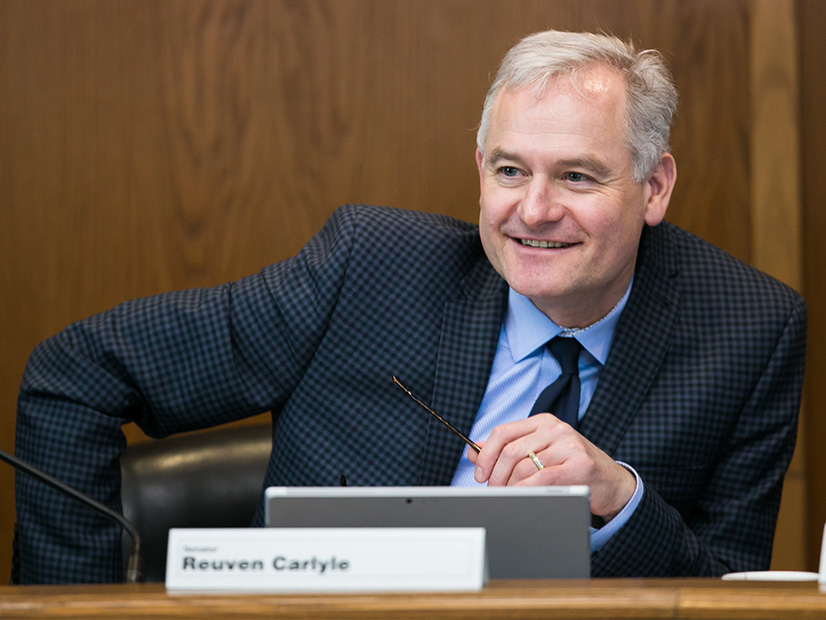Washington’s legislature passed two milestone climate change bills last weekend with the same codicil: They will go into effect when the legislators pass a transportation budget.
The two legislators who shepherded those bills through the just-completed legislative session told NetZero Insider they don’t see that requirement as a hurdle.
They regard a transportation budget package as a “must-have” since legislators want roads, bridges and infrastructure improved in their districts, said Rep. Joe Fitzgibbon (D), author of the just-passed low-carbon fuels bill. (See LCFS Bill Passes Washington Legislature.)
The question is when such a package will be passed, said Fitzgibbon and Sen. Reuven Carlyle (D), author of the bill that will implement the cap-and-trade program. (See Wash. Becomes 2nd State to Adopt Cap-and-trade.)
A special session could be called later this year. It could be handled in the 2022 supplementary 60-day budget session. Or it could be tackled in 2023 during the legislature’s next full 125-day session.
No one knows. And it is too soon after completing a session for anyone to think about tackling details of a transportation package, Fitzgibbon and Carlyle said. However, delay on passing a transportation package means that implementing the cap-and-trade and low-carbon fuels bills could be delayed, Fitzgibbon said.
Last weekend, the Senate went to the last minute before reaching compromises acceptable to Democratic majorities in both chambers. Republicans in both chambers opposed the bills, which Fitzgibbon and Carlyle described as major, revolutionary steps in combating climate change.
Gov. Jay Inslee wants to sign both bills after trying for years to first get them by a previously GOP-dominated Senate and then through a later Democratic Senate that included enough swing districts to cause some in his party to balk.
Venn Overlap
Carlyle and Fitzgibbon said much negotiation had to be done among the moderate and liberal wings of each caucus. “There were serious political and policy conversations. … There is naturally a Venn diagram overlap” among transportation, cap-and-trade and low-carbon fuels, Carlyle said.
The bottom line is that Carlyle and Fitzgibbon needed the transportation package plank to collect the necessary votes.
Fitzgibbon’s low-carbon fuels bill saw the bigger change in the compromise talks, changes that he believes slow implementation of the bill but were needed to get enough votes.
The bill originally required that carbon emissions from gasoline and diesel fuel sold in Washington be cut by 10% below 2017 levels by 2028 and by 20% by 2035. It excludes emissions from fuel that is exported out of state or used by water vessels and railroad locomotives. The final compromise bill bumped the 20% goal to 2038.
“I still think that is pretty slow,” Fitzgibbon said.
The compromise bill added a 5-cent/gallon gasoline tax. The original bill set a goal that Washington grow its biofuel feedstocks — wood chips and forest slash, camelina, starches and other plants — by 20% by 2035. The compromise bill moved that target to 2038.
The goals apply to overall vehicle emissions, not to individual types of fuels. (Northwestern Washington has five oil refineries.) The rules go into effect Jan. 1, 2023, if a transportation package is passed by 2022.
Under the program, biofuels would likely be blended with petroleum-based fuels. State officials have said vehicle emissions account for 42-45% of Washington’s carbon pollution.
Carlyle’s “cap-and-invest” bill requires Inslee to appoint a task force by July 1 to lead brainstorming efforts on a creating a cap-and-trade program administered by the Washington Department of Ecology. The program would go into effect when a transportation package is passed.
The task force will create a system to annually set the state’s total industrial carbon emissions, a cap that slowly decreases through the years. Four times a year, large emitters would submit bids in an auction for segments of that year’s overall limit and be allowed to emit that amount in greenhouse gases. Companies will be allowed to trade, buy and sell those allowances.
An environmental justice panel would be appointed to ensure low-income neighborhoods and communities of color would not be disproportionally hit with excess pollution.
The bill anticipates the auctions would raise several hundred million dollars that the state can allocate to disadvantaged communities.
Preliminary task force recommendations would be due by Nov. 1, with final recommendations ready to be sent to the legislature by Dec. 1.



